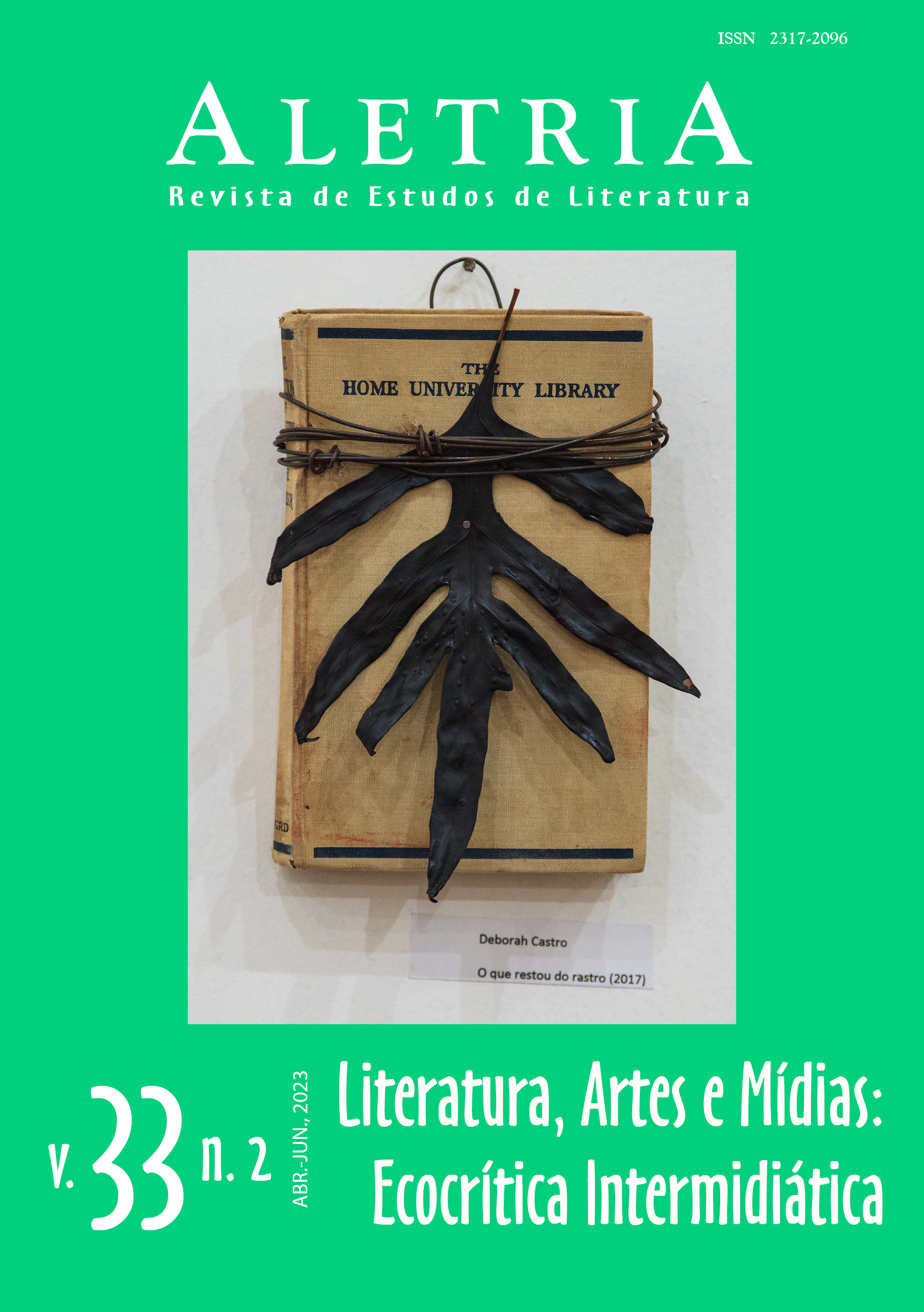Conciliando o papel duplo dos humanos como seres biológicos e agentes geológicos no Antropoceno em Weather, de Jenny Offill
DOI:
https://doi.org/10.35699/2317-2096.2023.41007Palavras-chave:
Antropoceno, Mudanças climáticas, Jenny Offill, Literatura ClimáticaResumo
O Antropoceno, a proposta geológica para nomear a presente Época e descrever o enorme impacto dos humanos na biosfera, precipitou uma mudança na forma com que os humanos compreendem a si mesmos. Não mais apenas um agente biológico, o humano é agora (também) um agente geológico, capaz de alterar os sistemas da Terra da mesma forma que as grandes catástrofes naturais o fazem, como enormes erupções vulcânicas, o impacto de grandes meteoros e o movimento de placas tectônicas. Em Weather (2020), da autora americana Jenny Offill, acompanhamos Lizzie, uma bibliotecária, na jornada de chaveamento cognitivo que a leva a refletir sobre seu papel no desenrolar de eventos como a crise climática, a sexta extinção em massa, o aumento do nível dos mares, entre outros. Neste artigo, exploro tanto a transição de Lizzie no romance quanto o papel da ficção realista em discutir a categoria praticamente impossível do Antropoceno.
Referências
BUCK, Holly Jean; GAMMON, Andrea R.; PRESTON, Christopher J. Gender and Geoengineering. Hypatia, Cambridge, v. 29, n. 3, p. 651- 669, jun./ago. 2014.
Chödrön, Pema. The Places that Scare You: A Guide to Fearlessness in Difficult Times. Boston: Shambhala, 2001.
Clark, Timothy. Nature, Post Nature. In: WESTLING, Louise (ed.). The Cambridge Companion to Literature and the Environment. Cambridge: Cambridge University Press, 2014, p. 75-89.
Crutzen, Paul J. We aren’t doomed? An Interview with Paul J. Crutzen. In: Möllers, Nina; Schwägerl, Christian; Trischler, Helmuth (ed.). Welcome to the Anthropocene: The Earth in Our Hands. Munique: Deutsches Museum, 2014.
Ghosh, Amitav. The Great Derangement: Climate Change and the Unthinkable. Chicago: The University of Chicago Press, 2016. E-book.
Holsinger, Bruce. Bruce Holsinger, THE DISPLACEMENTS & Elizabeth Crips, WHAT CLIMATE JUSTICE MEAND AND WHY WE SHOULD CARE. [Entrevista cedida a] Writer’s Voice with Francesca Rheannon. Ago. 2022. Disponível em: https://www.writersvoice.net/2022/08/bruce-holsinger-the-displacements-elizabeth-cripps-what-climate-justice-means-and-why-we-should-care/. Acesso em: 13 ago. 2022.
Johns-Putra, Adeline, Goodbody, Axel. The Rise of the Climate Change Novel. In: JOHNS-PUTRA, Adeline (ed.). Climate and Literature. Cambridge: Cambridge University Press, 2019. p. 229-245.
Latour, Bruno. Facing Gaia: Eight Lectures on the New Climatic Regime. Cambridge: Polity Press, 2017. E-book.
Offill, Jenny. Weather. New York: Vintage Books, 2020.
Prather, M.; BLAKE, D. F. Sherwood Rowland (1927–2012). Nature, v. 484, p. 168, abr. 2012. Disponível em: https://www.nature.com/articles/484168a#:~:text=Returning%20home%20one%20evening%2C%20Rowland,the%20end%20of%20the%20world%E2%80%9D. Acesso em: 12 ago. 2022.
RUSS, Sandra W. Development of Creative Processes in Children. New Directions for Child and Adolescent Development, v. 1996, n. 72, p. 31-42, 1996.
ZALASIEWICZ, Jan et. al. When did the Anthropocene begin? A mid-twentieth century boundary level is stratigraphically optimal. Quaternary International, v. xxx, p. 1-8, 2014.
Downloads
Publicado
Edição
Seção
Licença
Copyright (c) 2022 Melina Pereira Savi (Autor)

Este trabalho está licenciado sob uma licença Creative Commons Attribution 4.0 International License.
Autores que publicam nesta revista concordam com os seguintes termos:Autores mantém os direitos autorais e concedem à revista o direito de primeira publicação, com o trabalho simultaneamente licenciado sob a Licença Creative Commons Attribution que permite o compartilhamento do trabalho com reconhecimento da autoria e publicação inicial nesta revista.Autores têm autorização para assumir contratos adicionais separadamente, para distribuição não-exclusiva da versão do trabalho publicada nesta revista (ex.: publicar em repositório institucional ou como capítulo de livro), com reconhecimento de autoria e publicação inicial nesta revista.Autores têm permissão e são estimulados a publicar e distribuir seu trabalho online (ex.: em repositórios institucionais ou na sua página pessoal) a qualquer ponto antes ou durante o processo editorial, já que isso pode gerar alterações produtivas, bem como aumentar o impacto e a citação do trabalho publicado (Veja The Effect of Open Access).





